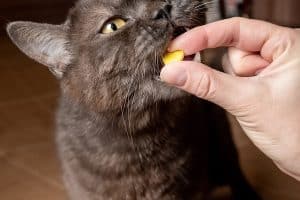
Check out our latest products
Finding the right caregiver for your senior cat can feel overwhelming. Older cats need a gentle approach, and many require specialized care. The best sitter for your senior cat will be familiar with their unique needs. That might include managing mobility issues or sensory decline, following a specific dietary plan, or simply maintaining a peaceful presence.
Fortunately, it’s entirely possible to find reliable care for your senior cat—if you know what to look for. The ideal sitter will have experience caring for older cats, be equipped to handle emergencies, recognize subtle signs of illness, and provide regular updates to keep you in the loop. If your situation calls for it, they’ll be proficient in administering medication as well.
In this guide, we’ll explore the different options available for senior cat care. We’ll also share insights from two veterinarians: Dr. Aimee Warner, resident veterinarian at Waggel, and Dr. Bethany Hsia, co-founder of CodaPet. Here are the types of sitters you’ll encounter, where to find them, and how to choose the best fit for your senior cat.
Drop-Ins Vs House Sitting Vs. Boarding for a Senior Cat
There are three main types of senior cat care, each with its own pros and cons. The right choice really depends on your senior cat’s personality and specific needs.
| Drop-in | House sitting | Vet boarding | |
| Good for | Healthy, independent senior cats | Senior cats with mild health conditions | Senior cats with more serious or unstable health conditions |
| Bad for | Cats with health issues; cats who are distressed by unpredictable visitors | Extremely shy senior cats who are uncomfortable with long-term house guests | Anxious senior cats who don’t need close veterinary monitoring |
| Services available | Sitters usually take 30-60 minutes to freshen food and water bowls, clean litter boxes, give meds, and play with your cat | Continuous care in the comfort of your home; Sometimes, house-sitters take on extra house tasks like collecting mail, taking out trash, and cleaning. | 24/7 supervision (depending on the facility); professional medical care |
| Costs ($, $$, or $$$) | $ (affordable) | $$$ (can be expensive) | $$ (moderate) |
Drop-in visits
Drop-in visits involve a pet sitter coming to your home once or twice a day to feed your cat, clean the litter box, give medication if necessary, and provide some temporary companionship.
For senior cats who are healthy and self-sufficient, drop-in visits are usually recommended. This arrangement lets cats stay in their own home, which is ideal for seniors easily rattled by disruption to their routine.
However, for many senior cats, having a stranger come over unexpectedly can be too stressful. If your cat tends to react negatively to sudden visitors, drop-ins might not be the best fit. Additionally, if your cat needs more frequent interaction or has special needs, a daily drop-in might not suffice.
If you go this route for your senior cat, Dr. Warner says that longer, less frequent visits are less stressful than shorter, more frequent visits.
House sitting
House sitting involves a caretaker staying in your home, which helps your cat maintain their routine and minimizes stress—crucial for cats with chronic health conditions like diabetes, kidney disease, or hyperthyroidism.
Dr. Hsia considers house-sitting a good option for cats who enjoy human companionship or those who become distressed when left alone for long periods. She also says it’s the preferred option for senior cats with minor medical issues who need more involved care. “A qualified cat sitter can adhere to medication schedules, monitor food and water intake, and report back to the owner or contact the vet if they observe changes in symptoms,” says Dr. Hsia.
However, house-sitting won’t suit all senior cats. If your pet is uncomfortable with new people or exhibits stress when visitors are present, a live-in sitter could be challenging. And in cases where extensive medical care is needed (e.g., intravenous fluids, close monitoring, etc.), veterinary boarding may be more appropriate.
Vet boarding
Boarding your senior cat at a veterinary clinic might make sense if they have more serious health issues. Often, this option includes access to veterinary staff who can address specific health needs and closely monitor cats with unstable conditions.
That said, the clinical setting tends to be stressful for older cats, especially those who are sensitive to change or the presence of other animals. If your cat is shy or anxious, in-home care might be the better option. Ultimately, you’ll want to weigh your cat’s medical requirements against their personality.
If you’re leaning towards vet boarding for health reasons, consider whether the facility offers 24-hour supervision. It’s also worth noting that some facilities provide video streaming, so you can check in on your senior cat from afar.

Olga Chetvergova via iStock
Where To Look for a Sitter for a Senior Cat
Once you’ve decided what kind of care you’d like, you can begin to look for a provider. Here are some good places to start your search.
- Pet-sitting platforms: App-based platforms like Rover offer background-checked sitters with profiles, booking, and payment options.
- Meowtel: Focuses exclusively on cat care. Sitters are vetted and insured.
- TrustedHousesitters: Links pet owners with sitters who look after cats in return for accommodation.
- National Association of Professional Pet Sitters (NAPPS) and Pet Sitters International (PSI): These organizations maintain directories of qualified sitters who go through certification courses to enhance their skills.
- Ask your veterinarian: they will often have trusted staff who pet-sit on the side.
- Seek referrals from friends, family, or neighborhood community sites, like NextDoor.
How To Vet Sitters for a Senior Cat
Finding the right sitter for your senior cat requires a little extra effort, but it’s worth it. Here’s how to narrow down your pool of candidates.
Filter search results
As you browse sitter profiles on various apps, take advantage of filters to highlight those who can meet your cat’s specific needs. You may want to prioritize sitters who can give medication or injections, those with experience caring for older cats, or those available for overnight care.
Read reviews for relevant experiences
You can also check reviews to see how sitters have handled situations similar to your own. For instance, if your cat requires insulin shots, prioritize sitters who have received positive feedback for managing diabetic pets. Similarly, if your cat has a strict diet, find sitters whose reviews mention their dedication to following meal plans.
Assess emergency preparedness
Sitters should have a reliable way to get your cat to a vet if necessary. Ask potential caretakers if they have a car or access to cat-friendly public transport. You can also inquire about their emergency response plan.
Meetings and Trial Runs for a Senior Cat
Scheduling a low-stakes meet-and-greet with a potential sitter is always a good idea. This lets you observe how the sitter interacts with your pet and determine if they have the skills necessary to meet your cat’s level of care. Ideally, the sitter will demonstrate a calm, gentle temperament that reassures your senior cat.
Use this opportunity to ask the sitter about their experience with senior pets. Warner suggests discussing how they would handle issues like missed medication, a cat not eating, or litter box issues. “A good sitter will be at ease with noticing subtle signs of illness and be proactive in communication,” she notes.
Warner also recommends conducting a handoff trial where you ask the sitter to perform tasks like giving medication or feeding under your supervision. This lets you evaluate their comfort level and technique.
Setting Expectations
Transparency is crucial during the hiring process. Always clearly communicate your cat’s unique needs and challenges upfront—even if they seem like a lot.
“The most important thing is continuity of care,” emphasizes Dr. Warner. To ensure everyone is on the same page regarding your senior cat’s care, it helps to spell out exactly what they need. Dr. Warner suggests leaving written notes detailing things like:
- Feeding schedules: Write down your cat’s meal schedule, portion size, and any pertinent feeding instructions (such as heating up wet food).
- Medication management: If applicable, make sure the sitter is comfortable giving medications, whether they’re pills or liquids. Provide clear instructions if needed.
- Any unique needs: Share any mobility issues, sensory changes, anxiety issues, or other age-related concerns. Provide clear instructions on how to handle these challenges.







![[5G & 2.4G] 2K Indoor Security Camera for Home Security, AI Voice Change for 2-Way Talk, Motion Detection, Night Vision, 24/7 SD Recording/Cloud Storage, WiFi Home Camera, Pet Cam with Phone App](https://i3.wp.com/m.media-amazon.com/images/I/61I2U+sTT3L._AC_SL1500_.jpg?w=300&resize=300,300&ssl=1)






